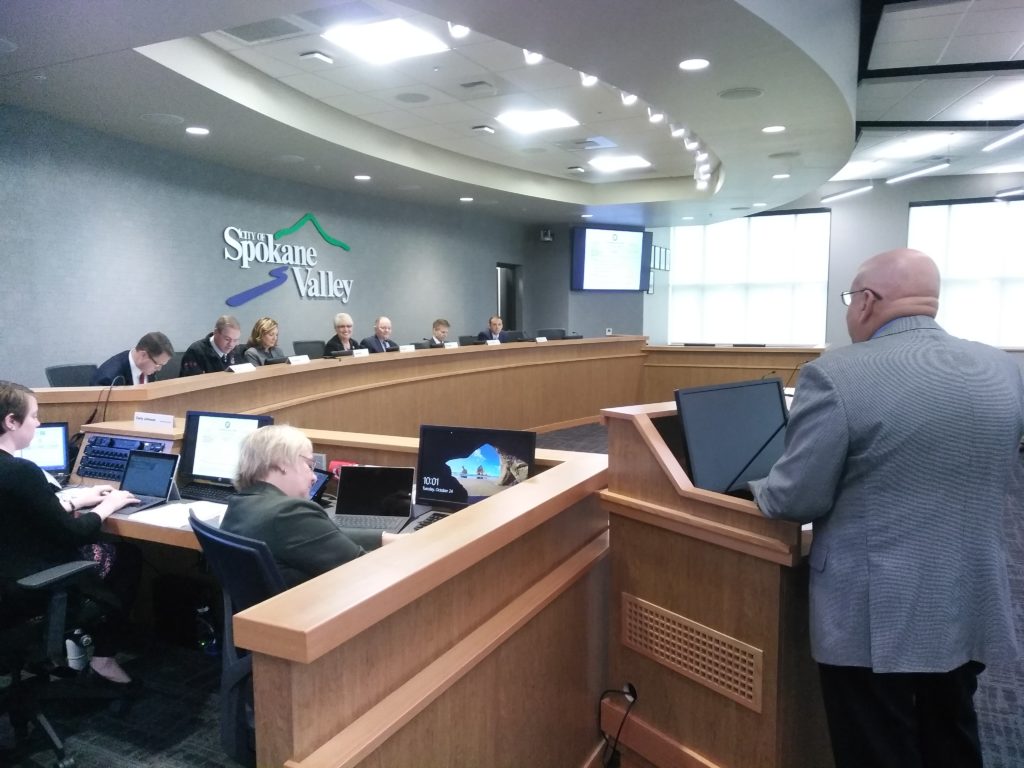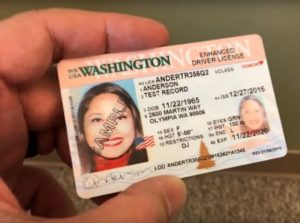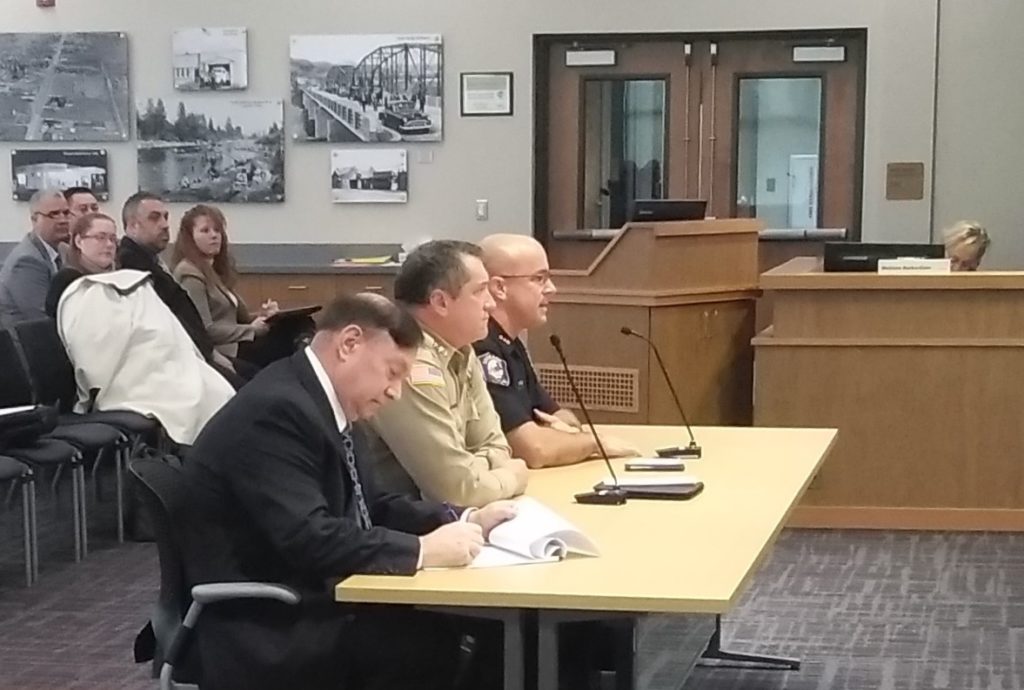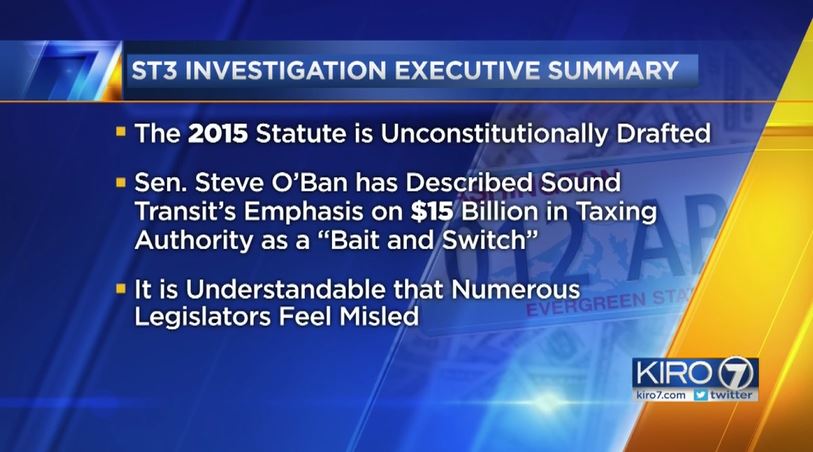The following newsletter was sent to subscribers to Sen. Padden’s Report From Olympia, Oct. 30, 2017. To subscribe to Sen. Padden’s newsletters, click here.
 Spokane Valley mayor Rod Higgins welcomes the Senate Law and Justice Committee Oct. 24 to a meeting at the new Spokane Valley City Hall. This hearing will be aired on the TVW cable channel at various times this week, including 11 a.m. Tuesday. It also can be seen on the Web.
Spokane Valley mayor Rod Higgins welcomes the Senate Law and Justice Committee Oct. 24 to a meeting at the new Spokane Valley City Hall. This hearing will be aired on the TVW cable channel at various times this week, including 11 a.m. Tuesday. It also can be seen on the Web.
Valley meeting spotlights Corrections problems, expanded educational choice
Dear friends and neighbors,
There’s an old saying in politics. When you’re under attack, if you can’t win on the facts, argue process. That’s how Sound Transit reacted this week as the Senate Law and Justice Committee released findings of serious misconduct by the Seattle-area commuter-rail agency. The agency and its defenders in the Legislature have attempted to divert attention by questioning our motives. Yet they have failed to respond to the issues we have raised. Sound Transit’s deceptive tactics in promoting a $54 billion bond issue has given all of government a black eye, and it is clear this will remain a major concern for next year’s Legislature.
Meanwhile, a work session we held in Spokane Valley Tuesday has called attention to other issues that likely will result in legislation next year. A recent ruling by the U.S. Supreme Court erodes restrictions on the use of voucher programs for private sectarian schools, expanding opportunities for school choice in this state. We also learned that too-lenient discipline procedures for offenders in the state’s community corrections programs pose a serious hazard for public safety. I’ll tell you more about these issues in this week’s newsletter.
Sen. Mike Padden
A little breathing room on drivers’ licenses
 In my last newsletter, I described the controversial new drivers’ license rules that are coming into play in our state as a result of the federal REAL ID act. We still don’t have a firm date, but it now appears that Washington residents will have about three years to upgrade drivers’ licenses to new federal standards. When the new rules kick in, Washington residents will need federally-compliant identification in order to board commercial air flights. What this will mean for most of us is that we will have to obtain new “enhanced” drivers’ licenses when we renew, and in order to get them, we will be required to prove our citizenship.
In my last newsletter, I described the controversial new drivers’ license rules that are coming into play in our state as a result of the federal REAL ID act. We still don’t have a firm date, but it now appears that Washington residents will have about three years to upgrade drivers’ licenses to new federal standards. When the new rules kick in, Washington residents will need federally-compliant identification in order to board commercial air flights. What this will mean for most of us is that we will have to obtain new “enhanced” drivers’ licenses when we renew, and in order to get them, we will be required to prove our citizenship.
What happened last week is that the federal Department of Homeland Security granted Washington an extension until Oct. 10, 2018 to establish an ID system that complies with federal rules. The Department of Licensing expects to be fully compliant by that time, as a result of legislation we passed this year. For states in our situation, Homeland Security has indicated that the airport regulations will not be enforced until October 2020.
Many of us have serious misgivings about the way Washington has chosen to comply. But the bottom line is that you’ll probably want to renew your license sometime in the next couple of years, and upgrade when you do it.
Sound Transit deceived public, investigation finds
Sound Transit, the agency that operates commuter rail in the greater Seattle area, has left a bad taste throughout the region for the tactics it used to promote a $54 billion bond issue last year. This week the Senate Law and Justice Committee laid out its findings in a way that ought to be clear to everyone. Our investigation concluded Sound Transit played fast and loose in its dealings with the Legislature and the voters, failed to disclose key facts and violated the constitution in the process. You can read more about it here.
The most disturbing thing about this case is that Sound Transit officials make no apologies for their misconduct, though they concede at least some of their actions were improper. The agency and its defenders in the Legislature have tried to argue that our inquiry was motivated by partisanship. They also have raised minor concerns about procedure and have told the press there is “nothing new.” This demonstrates just how serious the misconduct really was. They cannot challenge the facts we have presented, and they have attempted to shift the focus elsewhere.
We can be sure Sound Transit will be a front-and-center issue in next year’s Legislature. We can begin by requiring direct election of board members, and by cutting taxes for drivers who were stunned to see their license-tab fees increase by hundreds of dollars. Sound Transit’s questionable lobbying practices also warrant reform. While this may seem a distant issue for those of us in Eastern Washington, good government is a concern for the entire state.
In the News: Sound Transit’s misleading tactics under fire
KIRO-TV produced the report above about our Sound Transit findings — you can see it by clicking here. Here are some of the other notable stories that appeared in the media regarding our investigation:
The (Tacoma) News Tribune: GOP-led investigation says Sound Transit used trickery to sell $54 billion expansion plan
The (Everett) Herald: Senators’ report says Sound Transit fooled voters
Crosscut: State GOP says Sound Transit misled the public
KIRO radio: Senate investigation finds Sound Transit deceived voters
Green light for school vouchers?
A recent decision by the U.S. Supreme Court could make it easier for states like ours to adopt school-voucher programs and other measures that permit greater school choice. Washington, like many other states admitted to the Union in the late 19th century, was required to adopt a constitution that prohibited the use of public money for sectarian schools. These “Blaine Amendments,” as they are called, were rooted in the anti-immigrant bigotry prevalent at the time, and they have been used to block vouchers and other programs that allow parents to choose where their children receive a publicly funded education.
At our Law and Justice Committee meeting in Spokane Valley this week, we were told about a recent Supreme Court decision that has weakened these Blaine Amendments in Washington and — other states. In a decision concerning a Lutheran school in Missouri, the court decided that state’s Blaine Amendment did not bar the school from receiving a playground-safety grant. The key point is that any other non-profit organization was eligible. David DeWolf, professor emeritus at Gonzaga University School of Law, explained that the court has found it unconstitutional to single out religious institutions for disparate treatment.
The same principle can be applied to school vouchers – and we can be sure this issue will be a major debate in coming sessions. Liv Finne, education policy director for the Washington Policy Center, said the ruling is an opportunity “to liberate ourselves from a 19th-century condition of bigotry that was forced on Washington as a condition of statehood. The Blaine Amendment should not prevent us from moving forward in a cooperative, progressive, collaborative way to create new tools to help families educate their children, so all children can learn and can achieve the American dream.”
Another Corrections concern: Lax discipline for community supervision
 Area law enforcement officials testify at Spokane Valley hearing (left to right): Spokane County Prosecutor Larry Haskell, Chief Mark Werner of the Spokane Valley Police Department, and Chief Craig Meidl of the Spokane Police Department.
Area law enforcement officials testify at Spokane Valley hearing (left to right): Spokane County Prosecutor Larry Haskell, Chief Mark Werner of the Spokane Valley Police Department, and Chief Craig Meidl of the Spokane Police Department.
One fruit of our investigation into the Department of Corrections last year was the hundreds of contacts we received from front-line DOC workers who question the priorities of those who manage the agency. Because of it, we learned of a potentially serious problem brewing in the state’s community supervision programs. These programs took the place of parole in this state more than 30 years ago. The problem is how the state deals with those who violate the terms of their supervision – and what we learned at our Tuesday hearing makes a solid case for reform.
The state supervises about 18,400 offenders after their release from prison. Some caseworkers tell us as many as 25 percent of the offenders they supervise have warrants out against them at any given time — for failing to report, flunking drug tests, or other offenses. Corrections officers tell us the problem is a new system of discipline, adopted in 2012 amid budget pressure, that has been misnamed “Swift and Sure.” This program reduces supervision for non-violent offenders, and when they commit violations, the only penalty for the first few offenses is a short jail sentence of just a few days.
Retired corrections officer Jack Brucick told us that “criminals laugh when they are arrested because they know darn well they will be out within 24 to 48 hours.” Local law enforcement officials told us lax supervision procedures are one of the reasons for the high rate of property crime in our area. Spokane County Prosecutor Larry Haskell called for greater penalties for early offenses: “Punishment works – it works in the minds of all of them, and it also works in their minds when it is absent.”
Contact us
If you have a question or concern about state government, please do not hesitate to contact our office. We are here to serve you!
Phone: (509) 921-2460
Street address: 11707 East Sprague Ave., Suite 305, Spokane Valley, WA 99206
Email address: Mike.Padden@leg.wa.gov











